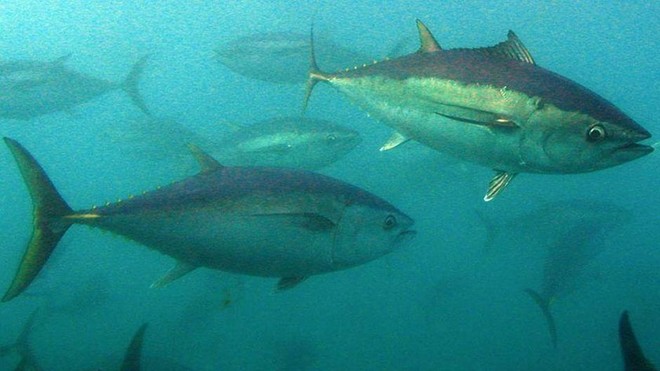Valerie Taylor needs to 'update facts' for views on Coral Sea
by Jeni Bone on 13 Jan 2012

The southern bluefin tuna - wild stocks are up. Kerstin Fritsches, file photo: AAP
Ron and Valerie Taylor are living legends in the realm of ocean documentary and research, contributing to and producing more than 40 films on sharks and undersea life since they began diving in the 1950s. Now, Valerie has joined the campaign to protect Australia's Coral Sea region and is calling on the Australian government to get serious about its recently released conservation plan.
'The Coral Sea is in danger from becoming so restricted species wise that maybe it'll take a long time to recover if ever,' she said, stating that the plan, while covering a large part of the Coral Sea, does not address saving sealife.
'The draft plan sounds wonderful and the government is sort of blinding the general public to the fact that it's huge, it covers a large area, but it doesn't cover the living reefs where the majority of the marine life is found. It only I believe from what I've seen takes in two islands with reefs, and that's two out of about 25. I think it's pathetic. The open ocean does have marine life but it's scarce and it's usually pelagic.'
Having dived in the region for 40 years, Valerie says the major difference between then and now is 'the lack of large fish around the reefs'.
'The longliners have been working those reefs for the last three decades I'd say, originally they were Japanese and you'd go out there and all you'd hear on the ships radio would be the Japanese talking to each other. And more frequently, more recently it's Australian and Taiwanese longlining, and the reefs are still in very good condition but the big fish are much scarcer.'
On their website they refer to their origins as spear fishing enthusiasts. 'Originally fishermen, the couple traded their spears for cameras with the intention of capturing the underwater world on film and hence cause it no harm.'
Both honoured by appointments as Member of the Order of Australia (AM), they are highly awarded and respected for their contribution to the scientific study of sharks. They were the first to film sharks by night are also credited with correcting the belief that sharks need to move forward to survive by obtaining footage of sharks sleeping on the sea-bed.
Valerie said she does not accept commercial and recreational fishers calling themselves 'farmers of the sea'.
'A farmer buys his land, clears it, fertilises it, plants his crop or puts his cows on it or whatever, and he takes care of it year after year. I'm 76, I was out there when I was in my late 20s, and I saw a world that no longer exists. It's still beautiful, it still has many fishes and wonderful corals and the water is clear and clean, but those great schools of tuna and schools of fish you couldn't even see through, they're gone. And the sharks have gone.'
Brian Jeffriess, CEO at the Australian Tuna Association, said Valerie and a lot of other 'experts' would do better to avail themselves of current practices and the scientific principles behind catch quotas.
'These are unsubstantiated, wild statements, and Valerie should know better. These days fisheries management is very tightly restricted – all decisions made on evidence,' he told FishingBoating-World.com, confirming reports in the mainstream press that tuna fishers have had the best start to a season in decades.
'To some extent, she has always said things off the cuff. Sometimes she has been right, and other times, there has been no evidence to support her views. In this case, she needs to catch up with current practices.'
As Jeffriess explained: 'The catch rate in the Coral Sea for Bigeye and Yellowfin Tuna is very strong. The annual quota was caught in five months. Tuna numbers fluctuate year to year, depending on currents, temperatures and other issues.
'But referring to locking away more area as Marine Parks and green zones, people need to realise fish don’t recognise borders. Because of temperature and other environmental factors their numbers vary from season to season. The quota numbers are very strictly maintained and reflect that each year. It’s set by mathematical formula, and set conservatively low compared to what you could take from that management.'
Before speaking out, Jeffriess suggested, people should investigate how modern fisheries are run. 'Fisheries have changed dramatically in recent years. Fishers have a huge investment in this industry – they purchase individual quotas mostly funded by the banks – and the last thing they can afford is for it to collapse or not have a prosperous, healthy and viable future. Of course, the government should always have a final decision, but it’s a consultation process and it’s ongoing.'
Rather than ridiculing opinions though, what industry and the community should be doing is 'celebrating fish stocks’ strong recovery, not looking to blame people who perhaps have the wrong impression, or are working with outdated facts'.
'Valerie is a living legend, but some of her ideas are outdated,' he said.
More at www.afma.gov.au
If you want to link to this article then please use this URL: www.sail-world.com/92849